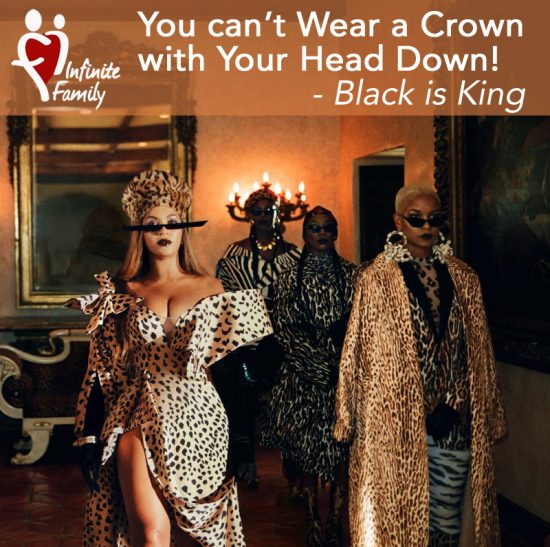
Extracted from writer Timmhotep Aku’s op-ed in VogueTeen exploring the criticism tied to Beyonce’s Black Is King and her position as an artist in a capitalist system.
…From Beyoncé, we expect rousing pop music, vocal dexterity, as well as performances and visuals filled with pageantry, glamour, elegance, attitude, and Blackness with a capital “B”…
Being Black has never been simple and in 2020, the expression of Blackness has become necessarily more politically nuanced and explicitly complicated…
In this era of critical (and hypercritical) thinking and social media reaction (and overreaction), being a Black celebrity with good intentions just isn’t good enough. Those with loud voices and big platforms are being challenged to read the room — and some books — before they speak their minds or express their solidarity through art). There was a time when fame afforded stars the benefit of the doubt if they engaged with the topics du jour in less than sophisticated ways but celebrity isn’t the shield it once was. The shield has become a target as we collectively wait for our faves to put a foot in their mouths. We expect them to disappoint us and we almost anticipate them playing themselves — and even our beloved Beyoncé is not exempt from the intensified scrutiny of 2020…
When the trailer for BIK dropped on June 28, it was met with all the enthusiasm and gleeful hyperbole one would expect for Beyoncé, but the din of the BeyHive’s buzz was pierced by the shouts of critics who found fault in the 70-second clip. The loudest early criticism came from African people on social media — those with immediate connections to the Continent, its 54 countries, and countless cultures and ethnic groups. They criticized the “Wakandafication of Africa” and were wary of yet another depiction of their continent as homogenized, primitive, tribal, and underdeveloped… We’re all too familiar with this narrow and racist conception of the Motherland coming from white people and non-Black POC. But a strain of this reductive thinking also exists in the imagination of a Black Diaspora seeking a connection to history, to a people, and to a landmass to set the right the violent disconnections of slavery…
That reductive adoration can feel empowering to African Americans but equally as offensive to someone from Accra, Lagos, or JoBurg who see their cultures as being essentialized and flattened… some of these critics who replied with images of metropolitan cities and expressed the desire to see less animal print and hides and more Lamborghinis to signal Africa’s seldom celebrated modernness…
Dear Net Buddies,
What do you think the “Black Diaspora” is?
What do you think about African American celebrities “translating” what it looks and feels like to be truly African?
Do you agree or disagree with Black Africans who criticize African Americans for their simplistic portrayals of Africa?
What permissions do you think the role of “artist” gives celebrities to make decisions about the costumes and sets they use to portray Africa?
You know what to do – write your answers down because we can’t wait to hear your thoughts here!